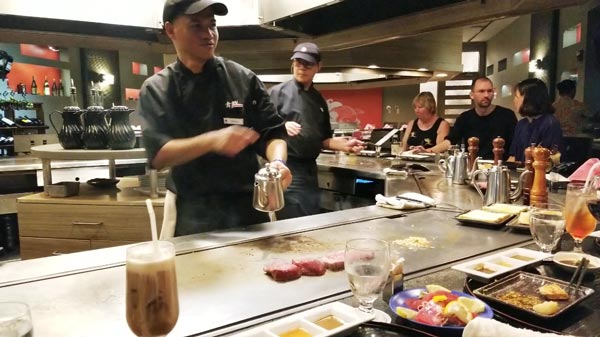BEFORE APPLYING FOR CW-1 RENEWALS
‘Wait for CNMI PWS first’

File photo shows teppanyaki chefs entertain-ing guests at the Mae Teppanyaki at Fiesta Resort & Spa Saipan in Garapan. (Jon Perez)
CNMI employers should put off applying to renew the CW-1 permits of their foreign workers or petitioning new foreign workers until the results of a CNMI-specific Prevailing Wage Survey are out. At least that’s what the Northern Marianas Business Alliance Corp. wants.
That PWS is a requirement when petitioning a foreign worker in the CNMI. Without a CNMI-specific PWS, the Guam prevailing wage survey results would be used, and the NMBAC is concerned that that would raise local wages to the Guam level and negatively impact the CNMI economy, which is still reeling from the effects of Super Typhoon Yutu in October last year.
NMBAC president Alex Sablan said this is their concern: The potential impact of Guam’s prevailing wages on the CNMI economy if a CNMI PWS is not completed in time for CW-1 renewals.
He pointed out that businesses are currently struggling, with the CNMI’s tourism market down 30 percent.
That concern for the need for a CNMI PWS is on top of the uncertainty of the time it’ll take to process CW-1 applications “with the new requirement for a U.S. [Department] of Labor prevailing wage determination and certification, then a U.S. [Citizenship and Immigration Services] application process within the limited time period for renewals.”
The results of the PWS will become the basis of the U.S. Department of Labor in issuing temporary labor certification to CNMI employers who would petition or renew the employment contracts of foreign workers under the CNMI-Only Transitional Worker program. The Office of Foreign Labor Certification had already released a 24-page list that contained hourly or annual wages for the likes of chief executives, cooks, food servers, engineers, teachers, and farmers.
Saipan Chamber of Commerce president Velma Palacios has spoken to some of their members and she said they are concerned “about how long they should wait before submitting the renewal [applications].”
That’s why, Sablan said, NMBAC is recommending for employers to wait for the results of the CNMI PWS. “Everyone applying for CW-1 visa applicant’s [should] consider waiting for the CNMI PWS to be completed and posted to the CNMI Department of Commerce, then apply for a wage determination with the U.S. DoL.”
Educational campaign
Sablan and Palacios said their groups have been working with the local government in disseminating information about the new policies and regulations.
“I believe the policies are straightforward and webinars are being conducted to make sure that employers understand the new requirements by U.S. DoL,” said Sablan.
“The SCC and NMBAC have been collaborating with the CNMI Commerce and Labor [departments] to educate the CNMI community on the issues related to early application of prevailing wages for the CNMI.”
Palacios added: “We are working with the Governor’s Office on the education campaign about the new requirements and also to complete surveys in a timely manner. Most businesses have not read the law and do not understand the new requirements.”
The local Commerce Department, with the help of Hive Analytics and DataTalks, are in the process of completing the PWS. They expect to end the survey by mid- to end of May.
“The contractor will make every effort to complete the PWS. It is the data collection which is the greatest challenge and we seek all employers to complete the survey in a timely manner for all their employees, whether CW1 or not,” said Palacios.
Kilili’s comments
Delegate Gregorio Kilili C. Sablan (Ind-MP) said the local business community could have done the PWS earlier, since U.S. Labor is just following what P.L. 115-218 states. “Regarding implementation of the NMI U.S. Workforce Act, as you will remember, both the governor and the NMBAC claimed responsibility for this law when it passed last year.”
“U.S. Labor is now carrying out the law’s mandates. Clearly, the business community would be in a better position had the Commonwealth government begun work on a prevailing wage survey as soon as the law was enacted, rather than waiting until now, when the application period is already beginning.”
He is optimistic, though, that the PWS would be done on time. “Though I am assured that the PWS will be done by sometime next month, the survey will still require review and approval by the U.S. Department of Labor before it could be used for CW permit applications.”
USCIS will start accepting CW1 applications for the coming fiscal year, 2020, that starts Oct. 1, on Thursday. All CW applications submitted without an approved TLC, which is one of the changes made under the U.S. Workforce Act, will be rejected.
Delegate Sablan said the new requirement would ensure that U.S. workers would be given fair advantage in employment. “The new requirement ensures that U.S. workers are not overlooked for the jobs in the Marianas and that hiring a CW worker will not adversely affect U.S. worker wages and working conditions.























